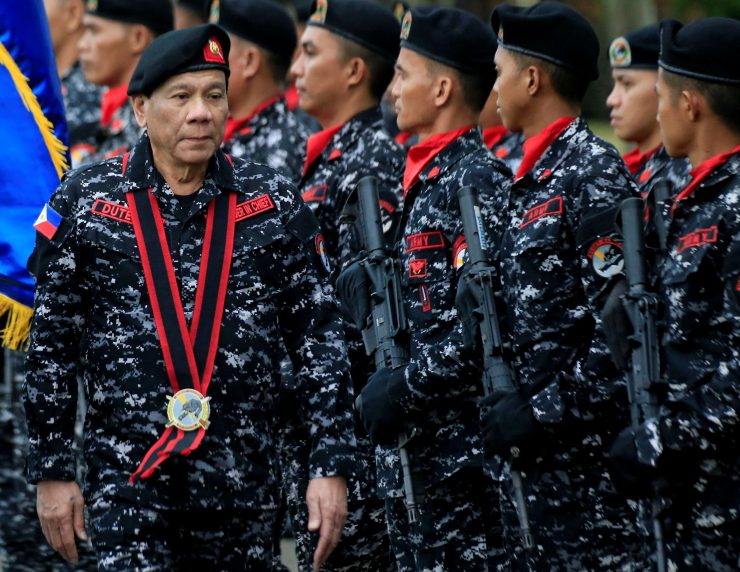Anti-terror bill sparks fears of Philippines descending into Duterte dictatorship

FILE PHOTO: Philippine President Rodrigo Duterte, wearing a military uniform, reviews scout ranger troops upon his arrival during the 67th founding anniversary of the First Scout Ranger regiment in San Miguel town, Bulacan province, north of Manila, Philippines November 24, 2017. REUTERS/Romeo Ranoco
BY KAREN LEMA AND MARTIN PETTY
Philippine President Rodrigo Duterte approved tough anti-terrorism legislation on Friday that rights groups condemned as a weapon to target opponents and stifle free speech.
The law grants security forces sweeping powers to act to fight militants, while legal experts say broad articles could allow discriminatory enforcement, privacy infringements and suppression of peaceful dissent, including on social media.
Duterte’s approval comes after a United Nations report on the Philippines that singled him out for publicly inciting violence and encouraging rights abuses, mostly during a war on drugs in which he promised to kill 100,000 people and pardon police who shoot suspects dead.
His opponents fear a crackdown on challengers to his popular autocracy before he leaves office in 2022, among them journalists, lawmakers, priests and activists seeking his international indictment over thousands of drug war killings.
The law creates an anti-terrorism council appointed by the president, which can designate individuals and groups as terrorists and detain them without charge for up to 24 days. It allows for 90 days of surveillance and wiretaps, and punishments that include life imprisonment without parole.
U.N. rights chief Michelle Bachelet had urged Duterte not to sign it. Human Rights Watch called the law a “green light to the systematic targeting of political critics and opponents” and said Duterte had “pushed Philippine democracy into an abyss”.
Amnesty International called it “a new weapon to brand and hound any perceived enemies of the state”, which would “worsen attacks against human rights defenders.”
Philippine rights group Karapatan said Duterte was seeking to emulate the late dictator Ferdinand Marcos: “This monstrous piece of legislation is, without any doubt, the final puzzle piece in Duterte’s Marcosian delusions,” it said.
Elevated threat
Duterte, 75, had fast-tracked the anti-terrorism act through both houses of Congress during the coronavirus outbreak. His spokesman Harry Roque said Duterte had taken time to study it, “weighing the concerns of different stakeholders.”
The president made no mention of the law in a speech to soldiers on Friday.
The government says the law is based on legislation in countries that have successfully dealt with extremism.
Defense chiefs say it will enable a better response to domestic threats, such as piracy, kidnappings and extremism by groups influenced by Islamic State, who occupied a southern city in 2017 and are now increasingly carrying out suicide bombings.
The law’s approval comes as series of legal and regulatory cases move forward against journalists and media organizations.
Those include top media group ABS-CBN, ordered to cease broadcasts on free-to-air and cable channels, and news website Rappler, embroiled in tax evasion and illegal ownership cases. Rappler’s award winning chief Maria Ressa was convicted of libel last month in a ruling that prompted international dismay.
Philippine President Rodrigo Duterte approved tough anti-terrorism legislation on Friday that rights groups condemned as a weapon to target opponents and stifle free speech.
The law grants security forces sweeping powers to act to fight militants, while legal experts say broad articles could allow discriminatory enforcement, privacy infringements and suppression of peaceful dissent, including on social media.
Duterte’s approval comes after a United Nations report on the Philippines that singled him out for publicly inciting violence and encouraging rights abuses, mostly during a war on drugs in which he promised to kill 100,000 people and pardon police who shoot suspects dead.
His opponents fear a crackdown on challengers to his popular autocracy before he leaves office in 2022, among them journalists, lawmakers, priests and activists seeking his international indictment over thousands of drug war killings.
The law creates an anti-terrorism council appointed by the president, which can designate individuals and groups as terrorists and detain them without charge for up to 24 days. It allows for 90 days of surveillance and wiretaps, and punishments that include life imprisonment without parole.
U.N. rights chief Michelle Bachelet had urged Duterte not to sign it. Human Rights Watch called the law a “green light to the systematic targeting of political critics and opponents” and said Duterte had “pushed Philippine democracy into an abyss”.
Amnesty International called it “a new weapon to brand and hound any perceived enemies of the state”, which would “worsen attacks against human rights defenders.”
Philippine rights group Karapatan said Duterte was seeking to emulate the late dictator Ferdinand Marcos: “This monstrous piece of legislation is, without any doubt, the final puzzle piece in Duterte’s Marcosian delusions,” it said.
Elevated threat
Duterte, 75, had fast-tracked the anti-terrorism act through both houses of Congress during the coronavirus outbreak. His spokesman Harry Roque said Duterte had taken time to study it, “weighing the concerns of different stakeholders.”
The president made no mention of the law in a speech to soldiers on Friday.
The government says the law is based on legislation in countries that have successfully dealt with extremism.
Defense chiefs say it will enable a better response to domestic threats, such as piracy, kidnappings and extremism by groups influenced by Islamic State, who occupied a southern city in 2017 and are now increasingly carrying out suicide bombings.
The law’s approval comes as series of legal and regulatory cases move forward against journalists and media organizations.
Those include top media group ABS-CBN, ordered to cease broadcasts on free-to-air and cable channels, and news website Rappler, embroiled in tax evasion and illegal ownership cases. Rappler’s award winning chief Maria Ressa was convicted of libel last month in a ruling that prompted international dismay.
No comments:
Post a Comment